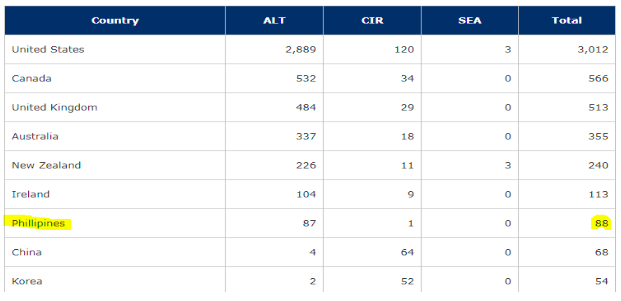Teaching English in Japan with the JET Programme: A Guide for Filipinos and other Non-Native Teachers
Japan has long been one of the top destinations for ESL teachers to teach English abroad. It has a rich culture, great food, and attractive wages to boot. Work experience in Japan also looks great on your resume thanks to its reputation for it’s a more serious approach to education – compared with nearby Vietnam and Thailand which are more famous for their relaxed lifestyles.

However, Japan is also one of the more difficult job markets to enter. Along with Korea, it has visa requirements, a very bureaucratic culture, and unlike China, they’re often reluctant to bend the rules. If you’ve got your heart set on teaching in Japan, you’ll need to take the right approach.
- The Complete List of English Teaching Sites and Apps Which Accept Native and Non-Native Teachers – Part 2
- How to Teach English in Thailand – The Land of Smiles!
- How to Teach English Abroad – Get 60% OFF Your TEFL Certification Online
- Where to Teach English Abroad? Countries with High-Demand for English Teachers!
- Teach English Abroad – A Filipino Backpacker Guide to TEFL
Already know how to get started teaching English abroad? Just want to take the online TEFL course? OK! Then get 60% off your 120 hours online TEFL course here with Promo Code TWOMONKEYS.
- How to Teach English in Thailand – The Land of Smiles!
- Teaching English in Japan with the JET Programme: A Guide for Filipinos and other Non-Native Teachers
- How to Teach English in Laos – Guide to Teaching in Vientiane and other small cities!
- How to Teach English in South Africa – English Teacher Jobs in Africa
- How to Teach English in Cambodia – Experience the Fun of Teaching!
More TEFL country guides coming soon!
To start things off let’s tackle a few of the popular questions:
- Can non-natives teach English in Japan: YES, non-native teachers can legally work in Japan.
- Can I teach in Japan without a degree: NO, unfortunately, you’ll need one for a work visa.
- Is it easy for non-natives to find work in Japan: It’s not easy, but it’s possible!
Table of Contents
Work visa requirements
To qualify for a work permit in Japan you’ll need to meet the basic requirements of having a bachelor’s degree and having an employer who is willing to hire you. With these two things secured you’ll be able to process an application for a work visa.
However, this doesn’t mean that your application will be approved.

During your application, you may also have to pass criminal record and health record reviews, and the Japanese government may reject your application if they’re not satisfied with the results. They may also reject your application based on your age (if you’re over 60 they may decide to not approve your application).
Your employer will also be expected to show why they need to hire you – a foreign worker – instead of a Japanese candidate. As such, they may need to show that you’re qualified for the job (such as having a TEFL certificate, relevant experience, particular expertise, or English language fluency).
How to find work in Japan: The JET program.
The Japan Exchange and Teaching (JET) Programme, according to their website is aimed at promoting grass-roots international exchange between Japan and other nations.
The first port of call for all non-native teachers in Japan should be the JET programme. This is a government-run programme which hires ALTs (Assistant Language Teachers) for public schools around Japan.
While they do have a preference for native English speakers (especially those from the US), they do also hire non-native teachers. Also, good news for Filipinos here as they’re among the most-hired non-native speakers through the JET programme:
 (JET teachers hired in 2018. Source: jetprogramme.org )
(JET teachers hired in 2018. Source: jetprogramme.org )
When applying for the JET program you’ll want to ensure that you make a strong first impression, as they can limit re-applications if you’ve previously been unsuccessful. We recommend making sure to have your resume reviewed by industry professionals, and having a great introduction video and demo class video at hand.
With our 120-hour TEFL course, we also include a free short course and downloadable resume template. With this we show you how to customize our resume template specifically for teaching positions, and provide extra guidance on passing interviews and filming demo classes:
Applying with schools directly
After completing your JET program application, you’ll want to start applying directly to schools. You’ll find two main types of school in Japan:
- Private language centres
- Public schools
They both have different purposes and different cultures. With public schools, you’ll find a slightly more relaxed environment, and with private language centres you’ll find more flexible hours and potentially higher rates of pay, but they expect you to work hard throughout each hour of the day. Private schools are essentially businesses, and they expect their money’s worth when paying for teachers.
It’s worth keeping this in mind when job hunting.
Applying with private language centers (difficult for non-natives)
Some of the larger private language centers such as Nova have several hundred branches around Japan. They often come under criticism for not hiring non-native teachers, despite there being legal room for them to do so under the government regulations.
However, in reality, it’s not always down to preference. Many of these schools would happily hire qualified non-native teachers, but due to their size and the fact that they’re hiring thousands of foreign workers, they can come under extra scrutiny from the government and can find it harder to get work permit applications passed without hiring candidates which meet a higher standard.
If you have a degree from a native speaking country, you might stand a chance at getting hired by them. However, some will require non-natives to have all of their schooling completed in English in a native speaking country before they’ll process an application. It doesn’t hurt to apply with them, but it’s not too likely to secure a position with larger chain schools as a non-native.
Applying with public schools (the best bet for non-native teachers)
While the JET program supplies teachers to public schools around Japan, this isn’t the only way that schools hire teachers. They can also hire teachers by themselves – and this includes hiring non-native teachers.
Your best bet is to search through job postings for public schools and apply with as many as possible.
Pro tip: Job advertisements online get a lot of applications. So if you’re really set on teaching in Japan you can consider browsing online for school directories and reaching out to them yourself. By contacting them to inquire about any possible vacancies, you’ll be showing initiative, and you might be able to secure a position before it gets posted on a job board. Just reach out to them and ask if they have any current or upcoming English ALT vacancies, and make sure to include your resume, intro video, and demo class video.
Increasing your chances
As job competition is quite high in Japan, you’ll want to do everything possible to increase your chances of success.
TEFL certificate: Having a reputable TEFL certificate can help to show that you have specific training for teaching English. Getting a course with assignment-based assessments will also provide you with an example of your work.
IELTS certificate: As a non-native speaker, schools might need some reassurance that your English skills are up to the job. While an interview can help to show off your fluency, the employers themselves are likely to be Japanese – and might not actually have good enough English to really tell how good you are. This is where having an IELTS certificate can take out the uncertainty.

Experience: If you have experience teaching English overseas/online that will really help. However, if you don’t, you might find that you have other experience which could still help your application to stand out. If you’ve done freelancing work for overseas clients using English, it’ll certainly be beneficial to mention.
With these tips in mind, you should hopefully be on the way to gaining your first job teaching English in Japan! If you don’t have a degree but would still like to start teaching overseas, you can check our guide for more info.

Are you on Pinterest? Pin these!







Hi! I am teaching English for 2 years and i really want to teach in Japan.Please give me some tips on how to find job there?
Good day, this is Louie Tuan, am 26 years old, from Philippines??, Im a Licensed Professional Teacher, currently working as a Public School Teacher here… Is there still have a chance for me get hired as an Elementary Teacher in your company? I would apply as public school teacher in your company… If you are interested, you may reach me at my #+639656425609
Hi,
I am a Filipino and holds a degree in secondary education major in English. I taught in the Philippines for 7 years. Currently, I am teaching English Language Arts in the United States and holds two Certified English Teaching Certificates (Arizona and New Mexico).
Can I apply as an English teacher in Japan?
Thanks!
Hi,
I am a Filipino and hold a degree in secondary education major in English. I taught in the Philippines for 7 years. Currently, I am teaching English Language Arts in the United States and holds two Certified English Teaching Certificates (Arizona and New Mexico).
Can I apply as an English teacher i. Japan?
Thanks!
I was an english teacher for 18 years. I aminterested to apply as assistant English teacher.
Hello! I am an elementary grade teacher here in Binaliuan Elementary Schhol, Tigbauan, Iloilo. I am interested in Teaching elementary grade learners in Japan. Is there an age requirement?How can I apply for this program?
Hi! Good day! I am a teacher in a public school in Las Pinas National High School, Philippines and currently teaching English subject. I want to teach in Japan. How will I start my application? Thank you.
Is there an age requirement?
How Can apply for this program?
How can I apply this programme?